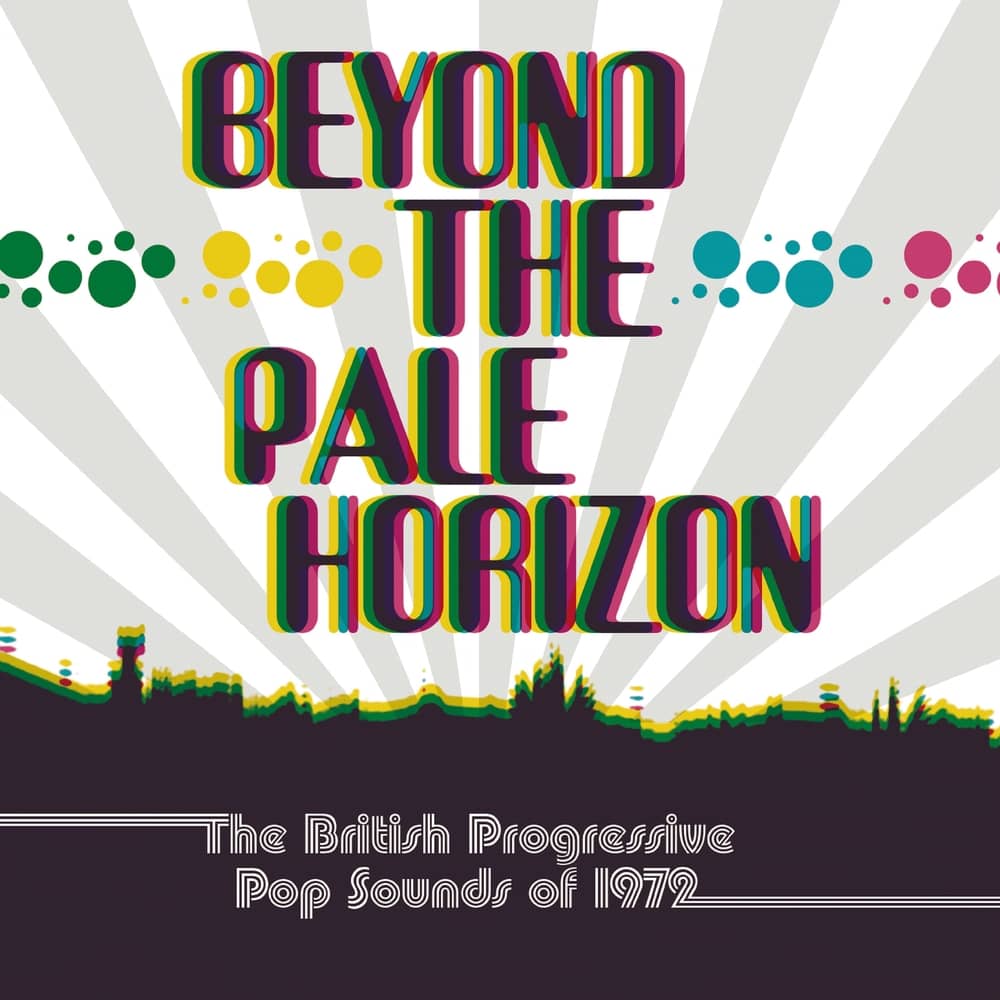Beyond The Pale Horizon – The British Progressive Pop Sounds Of 1972
The very first single to reach the number one position in the U.K charts in 1972 was a re-recording of a jingle penned to sell Coca Cola.
‘I’d Like to Teach the World to Sing (In Perfect Harmony)’ by the New Seekers may have seemed a fairly innocuous slice of radio-friendly AM pop, but both it and the now iconic ‘Hilltop’ advertisement that spawned it were particularly revealing of a bloated post-1960s cultural torpor.
The advert in question featured an array of fresh-faced teenage singers from all over the world huddled on a hillside in Italy. It was received extremely well by the viewing public and was a major corporate coup for Coca Cola- but it symbolised yet another turning point for a youth movement in a state of flux.
The accompanying song’s breezy utopian sentiments- of furnishing homes with love and growing apple trees for the honeybees and the snow-white turtle doves- would not have sounded out of place alongside the flower powered sunshine pop of the 1967 hit parade. But, as the multicultural ensemble, each adorning the colourful garb of their respective nations’ typicaldress, guide their lilting song to a celebratory climax- clutching not flowers but little glass bottles of you-know-what- it’s all too clear that Woodstock this is not.
“I’d like to buy the world a coke and keep it company,” they sing whilst one of their number, an uncanny doppelganger of the recently departed Janis Joplin, earnestly intones “it’s the real thing- what the world wants today.”
This was far from the first cash-in attempt to mimic the aesthetic, music and philosophy of the 1960s peace movement, but it was certainly the most prominent in its reach. Earlier efforts had been sold to the counterculture itself in the form of psychedelic exploitation films and hastily-formed trend-hopping bands, but now the stereotypical hippie image itself, the nature-loving, communal living peacenik so outré in 1967, was in the hands of suits who could bend it at will to sell any commodity.
Counterculture was being absorbed in tamer form into the mainstream and, in a clipped wing sense, becoming accepted culture. The once radical iconography of the 1960s was, increasingly by 1972- to quote another U.K number one from later that year by the curiously named ‘Lieutenant Pigeon’- ‘Mouldy Old Dough.’
Indeed, it could be argued that the world was a less colourful place in 1972, a more cynical and earthen outlook coming to replace the paisley, the kaftans and the beads of more idealistic days gone by.
Swinging London grew ever seedier against the backdrop of the greatest unemployment rates since the 1930s and the largest coordinated miner’s strike since 1926.
Elsewhere in the headlines, American bombers continued to rain death upon Vietnam despite seven years of intense but thus far seemingly fruitless anti-war protest all over the world. The Munich Olympics were overshadowed by a hostage crisis turned massacre. Violence spiralled out of control to the very precipice of outright civil war in Northern Ireland after a protest march in Derry against internment without trial was raked by rifle fire from British paratroopers.
It was a time of disillusionment only exacerbated further by the proliferation of hard drugs amongst the counterculture’s remaining holdouts, with heroin, cocaine and amphetamine use making the marijuana and L.S.D scares of five years previous seem quaint.
The world most definitely was not singing in perfect harmony- if anything, Don McLean was closer to the mark when he sang of a “generation lost in space- with no time left to start again.”
These factors coalesced in the diverse soundscape of the era’s radio airwaves- a smashed jigsaw puzzle reassembling itself in a manner entirely different to before, a splintered scene pulling in many different directions.
Of course, it should be emphasised, 1972 wasn’t all doom and gloom. The popularity of the short-lived genre of ‘glam rock’ was nearing its sequined apex, with Britain in the throes of ‘T-Rextasy’-the teenage fan furore centred around Marc Bolan growing so intense that the phenomenon drew comparisons in the media to the ‘Beatlemania’ of 1964.
Fellow glitter rockers Slade and the Sweet duked it out to dominate the singles chart, and, that summer, David Bowie returned to the limelight in spectacular fashion by releasing the seminal concept album that introduced his most enduring alter-ego to the masses- ‘The Rise and Fall of Ziggy Stardust and the Spiders from Mars.’
Such efforts were among the first real stirrings of a burgeoning cultural shift finally moving on from the oft-trawled glories of the recent past, veering instead into a future where the rulebook was not yet written.
In other words, as David Wells writes in his excellent-as-always introduction for Grapefruit Records’ new box set, ‘Beyond the Pale Horizon: The British Progressive Pop Sounds of 1972’, “in many ways, the Seventies didn’t really start- in terms of British music, at least, until 1972- when musicians finally stopped seeking inspiration from the past and began to create the first genuinely post-Sixties music.”
Aptly taking its name from within the lyrics of Roxy Music’s singular debut ‘Virginia Plain’- “as effective a mission in statement as any debut single in rock history” in how it “gleefully broke all the rules of hit singles”-‘Beyond the Pale Horizon’ is arguably the most comprehensive anthology of 1972’s recorded legacy to date, capturing with clarity the complexities and contradictions of a fascinating but oft-neglected year in British music.
As ever, Grapefruit don’t skimp on the inclusion of major hit singles, with ‘Pale Horizon’ featuring the likes of Electric Light Orchestra’s anthemic debut 45 ‘10538 Overture,’ the classic rock radio perennial that is Thin Lizzy’s version of ‘Whiskey in the Jar’, Argent’s opus ‘Hold Your Head Up,’ and Hawkwind’s signature song, the churning space rock of ‘Silver Machine’- an unexpected top three hit for a band beloved by the freak scene after playing free of charge outside a number of the most prominent ticketed music festivals of the era.
Other key acts from 1972’s singles chart- like Slade, Mott the Hoople, Yes and Lindisfarne- are featured via the inclusion of lesser played recordings from their respective discographies, but, as ever- once again to borrow the words of compiler David Wells- “as any Grapefruit regular is aware, failure is always more intriguing than success.”
Accordingly, ‘Beyond the Pale Horizon’ overflows with contributions that may have missed the charts but are nonetheless worthy equals to the better-known tracks they share disc space with. In a parallel universe, some of these songs may well have been huge hits- former Manfred Mann drummer Mike Hugg’s nostalgic ‘Blue Suede Shoes Again’ received very heavy radio airplay despite being all but forgotten by classic rock radio programmers today, whilst Montreal ex-pat Michel Pagliaro even earned a place on ‘Top of the Pops’ to promote his slick George Harrison-soundalike single, ‘Lovin’ You Ain’t Easy.’
Naturally, for every musical beginning enshrined within the four-hour runtime of ‘Beyond the Pale Horizon’, so too are there endings- particularly amongst Sixties stalwarts starting to sputter out of steam. It is difficult not to admire the determination of the Troggs who, despite having never inched anywhere close to the Top Thirty once their scintillating trail of hit singles ended abruptly in 1967, continued to aim high and record excellent material like the scorching Black Sabbath-esque rocker ‘Feels Like A Woman.’ Patrick Campbell-Lyons, meanwhile, resolutely stuck by the Nirvana banner for two more albums after the departure of Alex Spyropolous in 1970, the second of which, ‘Songs of Love and Praise,’ featured the accomplished ‘I Need Your Love Tonight’ but also re-recorded versions of the earlier Nirvana psychedelic pop classics ‘Pentecost Hotel’ and ‘Rainbow Chaser’- the inclusion of which hinted at some fatigueon Campbell-Lyons’ part in matching his earlier output and in keeping up with the pace of the changing musical landscape.
Obviously, however, as the box set’s name implies, the emphasis is very much on the ‘progressive’ end of the British music spectrum, a long-form subgenre that was beginning to enjoy great success on the album charts and live circuit but very seldom struck gold when it came to bestselling singles.
To that end, ‘progressive pop’ may sound a contradictory designation, but many songwriters did indeed apply the experimental tendencies of progressive rock to shorter songs with more pop-oriented structures in a gambit to gain radio airplay. Whilst it was a genre that later drew criticism for facilitating musical pretension and self-indulgence, this set emphatically affirms that, in 1972,prog certainly could not be criticised for lacking in eccentricity, eclecticism or originality.
Curved Air- an apparent exception to the unwritten hit single rule in that they enjoyed a smash hit in 1971 with ‘Back Street Luv’- continued to produce some of the best and most distinctive music of the era, and their idiosyncratic follow-up to that prior success, ‘Sarah’s Concern,’ appears on disc three. Meanwhile, Caravan- forerunners of the so-called ‘Canterbury Scene’- released ‘Waterloo Lily’ (from which disc one track ‘Aristocracy’ is sourced) hot on the trail of the critically acclaimed ‘In The Land of Grey and Pink’, Van der Graaf Generator (“arguably the most resolutely uncompromising band on the early 1970s progressive rock scene”) made an unlikely bid for a hit single with a cover of BBC Radio One’s ‘Theme One,’ and vegetarian band Stackridge made a witty but impassioned plea to meat eaters on ‘Friendliness’ number ‘Keep On Clucking.’
No stone remains unturned, and Grapefruit have once again dredged some truly strange sounds from the depths- Patto’s ‘Mummy,’ for instance, is genuinely disturbing despite having been penned as a comedic relief joke song for their third album, whilst even the most ardent crate-digging record collector could be forgiven for having never heard of the likes of ‘Rocky Cabbage,’ ‘Nimbo’ and ‘Grobbert& Duff.’
The real jewel in the crown for die-hard fans of the era, however, comes via the addition of a previously unreleased alternative mix of ‘Maypole’ by Dark, a song featured on their extremely rare debut album ‘Dark Round the Edges.’ Only 64 copies of the LP were pressed in 1972, to be given largely to family and friends, but, over the years, reverential word of the lost psychedelic classic rippled through collector’s circles. Consequently, ‘Dark Round the Edges’ became a cult classic and, when one colour gatefold copy recently auctioned for £25,000, one of the most valuable records ever sold.

It makes for an apt inclusion, epitomising as it does Grapefruit Records’ ethos of unearthing and the plainly apparent level of care they exhibit in compiling and packaging their clamshell box sets. Each disc is once again housed within its own paper sleeve, each adorned with different sympathetic artwork reminiscent of the album art of the era, and the accompanying illustrated forty-page booklet is- as ever- wonderfully well researched and written. Those who have purchased a Grapefruit set before will need little convincing to add ‘Beyond the Pale Horizon’ to their collections, but, for those who have yet to take that dive into yesterday, 1972 is as good a year as any to rediscover.
Jack Hopkin
Beyond The Pale Horizon – The British Progressive Pop Sounds Of 1972, 3CD Box Set (Cherry Red Records)



